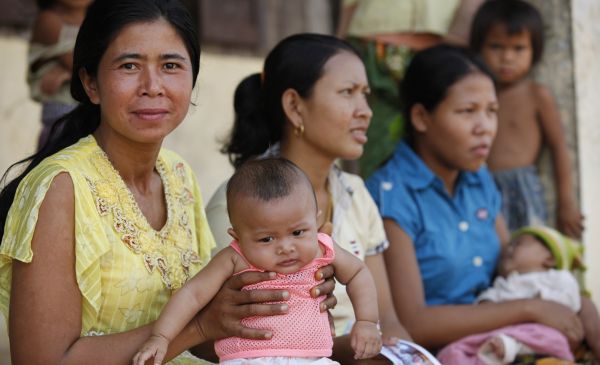
English / Bahasa
As I’ve mentioned in the past, all the workers in my section are women. Many of them are married and have children. Most of their husbands also work at factories.
Couples who are both working full time usually have their children cared for by grandparents or relatives. In other sections at my work there are male workers whose wives don’t work. These males just live in urban rental accommodation while their wives and children live at home back in rural villages. If both husband and wife work around Jakarta, their children will generally live with grandparents back at the village.
A friend of mine at work recently got her second warning letter because she often missed work. The reason why she didn’t attend work is because she had to return to the village to see her children. For example, she might go back to the village on Friday night. To do this she would have asked for permission to skip overtime (Saturday is generally the overtime day). Then she would come back on Sunday evening or night. On Monday, sometimes she couldn’t come to work because she would be exhausted from the journey.
Another friend of mine recently became a single parent. Her child is less than a year old, but her husband deserted both of them. Whether she likes it or not, she has to work full time to support her child. In the beginning, she could leave her child in the care of her older sister. But after a few months she had to put the child in the care of her neighbours, because her older sister also got work at the factory.
She has never complained to me, but I can sense that it is difficult for her. Once, her neighbour called during working hours. Her neighbour said that she was loosing her mind trying to calm the child who could not stop crying. It seemed that my friend had forgotten to leave a bottle of milk with the neighbour.
Another friend of mine is the leader of an organisation, but he often has to miss out on attending its meetings. He usually returns home on the weekends because his child and wife live back in a village. But he’s confused about what he should do. He is needed within the organisation, and with our working hours, organisational meetings are more often than not held on weekends, at the only time he can go home to visit family.
Have a question?
I might not be able to respond straight away but I’m happy to answer your questions about my life in Indonesia and my job at the sports shoe factory.
Photo credit: Timothy Herbert/OxfamAUS
Indonesian Version – Versi Bahasa Indonesia
Kondisi buruh perempuan yang sudah berkeluarga
Seperti saya bilang tadi, di bagian saya 100 % perempuan. Banyak yang sudah berkeluarga dan punya anak. Kebanyakan suami mereka juga buruh.
Yang suami-istri bekerja, biasanya menitipkan anaknya pada orangtua atau saudara. Di bagian lain, banyak juga buruh laki-laki yang istrinya tidak bekerja, di sini hanya menyewa kamar kost. Istri dan anaknya tinggal di kampung. Atau, kalau suami-istri sama-sama bekerja di sini, anaknya tinggal bersama kakek-nenek di kampung.
Teman saya (perempuan), baru-baru ini dapat SP 2 (Surat Peringatan 2) karena sering tidak masuk kerja. Tentu saja dia sering tidak masuk karena pulang kampung menengok anaknya. Misalnya dia pulang kampung hari Jumat malam. Itu berarti dia sudah minta ijin tidak lembur (hari Sabtu adalah hari lembur). Lalu dia kembali hari Minggu sore/malam. Hari Senin, bisa saja dia tidak masuk kerja karena kecapekan di perjalanan.
Ada lagi teman saya yang baru jadi single parent. Anaknya belum berumur 1 tahun, tapi suaminya pergi meninggalkan dia dan anaknya. Teman saya ini mau tidak mau harus tetap bekerja, untuk menafkahi anaknya. Pada awalnya, dia bisa menitipkan anaknya pada kakaknya. Tapi, beberapa bulan ini anaknya dititip ke tetangga saja, soalnya kakaknya itu sudah bekerja lagi di pabrik.
Dia tidak pernah mengeluh ke saya, tapi saya bisa merasakan, pasti sulit buat dia. Sekali waktu, tetangganya itu menelpon pada jam kerja. Katanya tetangganya itu sudah kehabisan akal membujuk anaknya yang menangis terus. Rupanya, teman saya lupa menitipkan susu…
Teman saya pengurus organisasi, ada yang sudah sering sekali minta dispensasi tidak ikut rapat organisasi. Dia sering pulang kampung pada akhir pekan, karena anak dan istrinya tinggal di kampung. Kami bingung juga menyikapinya. Dia dibutuhkan di organisasi, dan dengan kondisi kerja kami, rapat2 organisasi lebih banyak dilakukan pada akhir pekan…justru dia pulang kampung…